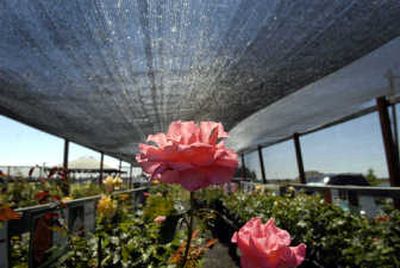Love of roses blossoms into business

To many people a rose is simply a single, long-stemmed red beauty. But Carol Newcomb knows better.
“There are thousands and thousands of varieties of roses,” she says.
In her third season as owner of Northland Rosarium in south Spokane, Newcomb sells more than 350 varieties of roses, and her own garden blooms with more than 1,000.
Newcomb has been growing roses for about 20 years. She inherited her love of gardening from her parents while growing up on a farm in north Spokane. Now her home is surrounded by lush rose gardens, with colors ranging from snowy white to all shades of pink, orange, yellow and even purple and copper. And, of course, red.
From roses that trail on the ground, called green snake, to climbing roses that reach more than 30 feet high there are many different kinds of roses. Their fragrance can be fruity, musky, or sweet. Single roses have only five petals, but some blooms can have more than 120 petals. With such diversity people are learning to appreciate the less common varieties.
“Gardens are getting pretty sophisticated,” says Newcomb. “People like something different, something new. Something they haven’t seen before.”
One of her favorites, Kordes roses, recently came into the U.S. from northern Germany. Extremely hardy, these roses have been bred to withstand cold climates and are resistant to many common rose maladies. Newcomb recently obtained a license to sell the Kordes roses which are patented.
Another of Newcomb’s favorite series is the Dr. Griffith Buck roses. Buck was a professor of horticulture at Iowa State University who bred a very hardy series of roses that could brave the winters on the Iowa plains. So, although they are not well-known in this area, they are a perfect fit for the climate.
“I don’t know if people just don’t know enough about them, or they don’t get enough attention because he’s passed away, but it’s a wonderful group of roses for Spokane,” says Newcomb. “They’re really hardy, wonderful bloomers. He was from the Iowa prairie, so his roses have prairie names like Barn Dance, Prairie Princess, and Hawkeye Belle.”
All the roses sold from Northland Rosarium are own-root roses, meaning they are grown from their own roots, not grafted. Unless covered well over the winter, the graft will be killed, and only the rootstock will remain. Moreover the rootstock is very vigorous, and may send up shoots to compete with the graft.
Newcomb also offers companion plants. These are blooms that complement roses, such as English delphiniums, hydrangea, lavender and clematis.
“If you have a garden that’s all pink, or pastels, or even reds, and you put a yellow rose in that garden, it makes everything else look better,” says Newcomb. “Yellow roses have a brightness about them that makes everything look good.”
One of the most common kinds of roses is the red hybrid tea, which one sees in florists. Hybrid tea means a rose with one tall stem with one bloom on top. It’s created by hybridizing two roses, the tea rose, and a rose of whatever color and fragrance one desires.
Rare roses are those that have dropped out of the industry, or older varieties. Newcomb has roses from the 1800s, which frequently have more petals and are very fragrant. She often gets calls from customers searching for an elusive bloom.
“People are really looking hard for them,” she says. “They’ll call and ask if I have a certain rose they’ve been hunting all over for. Sometimes we will, sometimes we won’t. It’s like a treasure hunt. If I tell somebody I have that rose they’re so excited. They found their grandmother’s rose, or whatever. It’s fun being able to help someone like that.”
Newcomb plans to expand her gardens. She’s now working with landscape designers on additional features and a display bed of Kordes roses. Tea parties are also a possibility, as are wedding ceremonies. She encourages people to bring a picnic lunch and relax amid her blushing blossoms.
“The roses get to be like friends,” says Newcomb. “I work with them every day. I water and fertilize and weed them. You get familiar with them.”